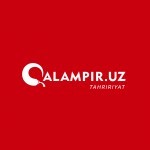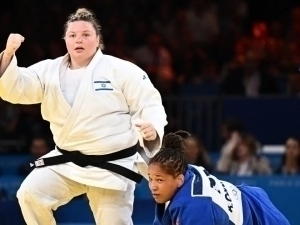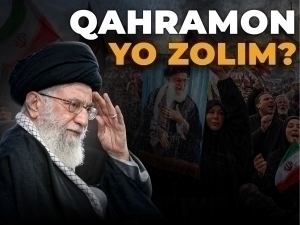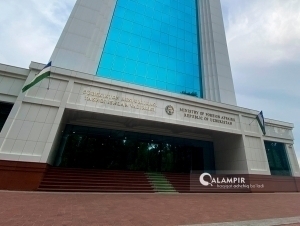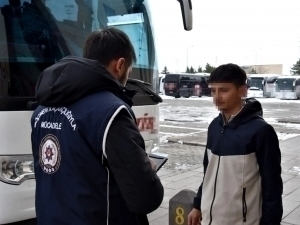Threatening Ramzan, apologizing Putin, sick Asma Assad, growing debt: Weekly digest
Review
−
29 December 2024 12634 19 minutes
We have left another week behind. Another year is coming to an end. The events we considered extremely important at the beginning of the year now seem insignificant. Time flies, and so many scandals and unprecedented events occur worldwide that it becomes difficult to keep up. Uzbeks, who earlier this year focused on gas and electricity limitations, have now turned their attention to the assassination attempt on key officials. Global debt, wars, immigration restrictions, and inflation are not only affecting major businessmen but also ordinary Uzbeks. Entrepreneurs whose markets were empty in the summer are now facing growing losses. Rising gas and electricity prices, power outages, and financial strain are impacting small, medium, and large enterprises alike.
Meanwhile, double standards continue to dominate globally. Terrorists find platforms online, while those shedding innocent blood speak of peace and justice. 2024 will be remembered for its contradictions. Let's review the final week of the year together.
Those Who Interfere in Uzbekistan's Internal Affairs
Who is Ramzan Kadyrov? The head of Chechnya, a region in the Russian Federation. But why does he feel entitled to question Uzbekistan's affairs? While Russian officials, including Maria Zakharova, have made demands of Uzbekistan in the past, Kadyrov's interference crosses a new line.
The issue? The assassination attempt on Komil Allamjonov, former head of the Information Policy Department, and Dmitry Li, head of the National Agency for Promising Projects. Kadyrov made headlines last week by demanding a statement from President Mirziyoyev's family.
“I am observing rumors spread by pro-Western media about discord in President Shavkat Miromonovich Mirziyoyev's family. Two months ago, reports surfaced about an attempt on Komil Allamjonov's life. This was hardly an assassination. The media, citing unnamed sources, accused me of involvement. Let me be clear: if I planned this, it would have been completed that day. Don't underestimate me.
I believe investigators handling this case should be thoroughly examined. This noise benefits internal players pursuing their own agendas. I advise against involving Chechnya in such matters. We Chechens have no interest in Uzbekistan's internal politics.”
Kadyrov claims a plot aims to undermine Uzbekistan's leadership by targeting loyal officials. He urges Mirziyoyev's family to clarify the situation and warns Allamjonov and Li against portraying themselves as victims.
“I urge Allamjonov and Li to cease playing the victim. If you continue, you will answer for your lies and deceit. I speak according to our traditions.”
Kadyrov's statements reflect direct interference in Uzbekistan's internal affairs, accusing Allamjonov and Li of fabricating events. So far, Uzbek authorities have remained silent. No Uzbek media outlet has mentioned Kadyrov's alleged involvement, leaving Kadyrov to speak for himself.
“As a person who is not indifferent to what is happening, I call on representatives of the esteemed Presidential family to make a statement and put an end to these dirty words. I recommend that Komil Allamjonov and Dmitry Liga not play the role of victims. Whatever you are planning, it is better to stop in time, otherwise, you will have to answer for all the intrigues, slander, and speculation. And now I am talking about the answer according to our tradition."
Ramzan Kadyrov is not only demanding a statement from Uzbekistan’s leadership but is actively interfering in the country’s internal affairs. His accusations against Allamjonov and Li suggest a preconceived plot, and his warnings verge on direct threats. So far, Uzbek authorities have chosen not to respond to Kadyrov’s remarks. Local media has remained silent about Kadyrov’s alleged involvement in the assassination attempt, leaving him to dominate the narrative.
The assassination attempt on Allamjonov stands out as one of Uzbekistan's most significant incidents in recent decades. Occurring just before parliamentary and local council elections, the attempt initially went unreported. The subsequent dismissal of high-ranking officials, including the chairman of the State Security Service, underscores the gravity of the situation.
Despite Kadyrov’s assertions, Uzbek law enforcement has confirmed the involvement of two Russian Chechens, Bislan Rasayev and Shamil Temirkhanov, aligning with reports from international media.
The Prosecutor General’s Office, investigating the assassination attempt on Komil Allamjonov, identified Rasayev and Temirkhanov as perpetrators. The two Chechens are accused of illegal border crossing, failure to report a crime, and unlawful possession of firearms.
Both individuals have been charged in absentia under the relevant articles of Uzbekistan’s Criminal Code. A search warrant has been issued, with detention listed as a preventive measure.
Crash in Aktau
The crash of an Azerbaijani Embraer 190 passenger plane en route from Baku to Grozny in the Kazakh city of Aktau on December 25 sent shockwaves across the CIS region and Turkey.
The plane carried 67 people, of whom 38, including two crew members, were killed. Among the victims were seven Russians, six Kazakhs, and 25 Azerbaijanis.
Upon hearing the news, Azerbaijani President Ilham Aliyev, en route to an informal CIS summit in St. Petersburg, returned to Baku and ordered the formation of a commission to investigate the crash. Criminal cases were opened in both Azerbaijan and Kazakhstan.
Initial reports suggested that a flock of birds might have struck the plane, leading to the crash. However, further investigation revealed more troubling possibilities. Suspicious, unexploded holes resembling bullet impacts were found in the plane’s tail. Survivors reported that an oxygen tank had exploded mid-flight, causing passengers to lose consciousness.
On December 26, Euronews cited Azerbaijani officials suggesting a more severe cause: a surface-to-air missile launched by Russia. The report claimed the missile was fired over Grozny, with fragments damaging the aircraft. The crew allegedly requested emergency landings at Russian airports but were denied, prompting them to divert to Aktau. The plane’s GPS reportedly failed while flying over the Caspian Sea.
"AnewZ", citing Azerbaijani sources, claimed the plane was downed by a Russian Pantsir-S air defense missile. Russian reports indicated that air defense systems in Chechnya were targeting Ukrainian drones at the time. Khamzat Kadyrov, head of Chechnya’s Security Council, confirmed drone activity over Grozny on December 25 but denied any damage or casualties.
On December 27, Azerbaijan Airlines issued its first official statement, attributing the crash to “external physical and technical influences,” a conclusion drawn from the ongoing investigation.
Azerbaijani MP Rasim Musabekov demanded Russia apologize for allegedly shooting down the plane, condemning media efforts to obscure responsibility. Musabekov insisted those responsible be held accountable and compensation paid to victims’ families, warning of potential diplomatic fallout otherwise.
Kremlin spokesperson Dmitry Peskov advised against premature conclusions, emphasizing the need to await the investigation's findings.
In response to the crash, Azerbaijan Airlines suspended flights to 10 Russian cities, citing safety concerns. Flights will remain grounded until preliminary investigations are complete.
U.S. intelligence sources suggested that early evidence pointed to a Russian air defense missile as the likely cause, with relevant information reportedly in the possession of U.S. agencies. The investigation remains ongoing.
Uzbekistan’s Total External Debt Reaches $60.2 Billion
Borrowing can feel easy—spending without hesitation. Yet, as the saying goes, “When you borrow, you lose your life.” By the end of the year, Uzbekistan’s total external debt stood at $60.2 billion. This figure reflects data from January to September, meaning the debt may have grown further in the final quarter of the year. Of this, $32.5 billion is public debt, while $27.7 billion is corporate external debt.
In the first nine months of 2024, Uzbekistan’s current account deficit decreased by 17% compared to the previous year, amounting to $3.4 billion or 4.3% of GDP. This improvement stemmed from a slower rise in the trade deficit and a surge in international remittances.
During the same period, the foreign currency reserves of Uzbekistan’s international assets fell by $678 million. However, the Central Bank highlighted that rising global gold prices boosted the country’s international reserves by $6.6 billion since January. By October 1, 2024, reserves totaled $41.1 billion.
Uzbekistan’s net international investment position strengthened by 29% since the start of the year, reaching $16.3 billion as of October 1.
Looking at past reports, as of January 1, 2024, Uzbekistan’s state debt was $34.9 billion—$29.6 billion in external debt and $5.3 billion in domestic debt. In the first nine months, external debt rose by $2.9 billion.
At the start of 2024, the Central Bank’s exchange rate for the US dollar was 12,355.16 soums. By year-end, it had risen to 12,904.91 soums, marking a 549.75-soum increase.
Uzbekistan Expands Combat Potential, Focuses on Drones
Uzbekistan is ramping up its military capabilities, with a particular focus on drones. In 2024, combat readiness initiatives increased by 1.5 times compared to the previous year, alongside enhanced training for command staff.
During a December 24 meeting of the Senate Defense and Security Committee, officials reported that military exercises involved significant collaboration with joint force structures. Uzbekistan conducted joint drills with the armed forces of the United States, India, Kazakhstan, Tajikistan, and Kyrgyzstan.
The Senate highlighted the exercises' emphasis on deploying unmanned aerial vehicles (UAVs) in modern combat scenarios, refining drone control tactics, and developing new operational strategies across different military levels.
Additionally, in 2024, military personnel from Azerbaijan, Kazakhstan, and Turkmenistan underwent specialized combat training in Uzbekistan.
The Senate report praised the Ministry of Defense’s efforts to implement directives from President Shavkat Mirziyoyev, aimed at strengthening national defense. Although the specifics of these initiatives were not detailed, the report indicated a significant enhancement of the Armed Forces' combat potential.
By analyzing modern conflicts and leveraging the experience of advanced foreign militaries, Uzbekistan has sought to bolster its national army's preparedness and adaptability.
5 Uzbek Citizens Died in Tatarstan
Six men died in a fire in the village of Malorechensky, Republic of Tatarstan, Russia. 5 of them are citizens of Uzbekistan.
It is noted that a house intended for temporary residence of workers burned down on the territory of a livestock complex in the village. There were a total of 39 people in the building. 33 of them managed to escape from the fire area, and one person was injured.
According to preliminary data, the fire was caused by a violation of the rules for the use of electrical equipment.
Following this incident, a criminal case was opened against Elena Sobina, the daughter of the former Minister of Agriculture of the Udmurt Republic of Russia, for “providing services that do not meet safety requirements,” “cold-bloodedness,” “organizing illegal migration,” and “violating fire safety requirements” due to a fire in a dormitory where migrant workers lived. However, Elena did not plead guilty.
By court order, she was placed under house arrest until February 24, 2025. According to her lawyer, Rakhim Bayramov, three relatives of the deceased were paid 1.5 million rubles in compensation (only one person was officially recognized as a victim). The rest have not yet received bank transfers due to Western sanctions. The lawyer added that Sobina turned herself into an investigator of her own free will.
According to the initial version of the investigation, in 2023, the head of the farm rented a non-residential building in the village to accommodate workers. At the same time, the general director of the farm was supposed to ensure the necessary conditions for the normal operation of the building, and the head of the farm was supposed to comply with fire safety regulations. However, none of these requirements were met. In particular, it was found that the facility did not have a round-the-clock duty, an automatic fire alarm system, notification, and evacuation control systems.
Later, the Consulate General of Uzbekistan in Kazan confirmed that Uzbeks had died in the tragedy, revealing that the five were aged 48, 59, 54, 29, and 22.
The situation was taken under the control of the Consulate General, consular diplomats were urgently mobilized to the scene and necessary work was being done with the authorized bodies, in particular, measures were being taken to identify the deceased and organize the return of their bodies to Uzbekistan.
It should be recognized that in Russia, Uzbeks are not only dying but also killing. This week, a court verdict was read out to Uzbeks accused of killing three people in the Kaliningrad region of Russia.
According to the publication, in December 2022, two Uzbeks tried to rob a resident of the village of Nevskoye, Gurev district, Kaliningrad region. To do this, they entered his house under the pretext of helping him with the registration of migration documents.
One of the Uzbeks stabbed the 58-year-old owner of the house, killing his 81-year-old mother and a 55-year-old resident who was in the house. They stole 65,000 rubles from the house and fled. They were found guilty of Article 162, Part 4, Clause “v” (invasion) and Article 105, Clauses “a” and “z” (intentional murder of up to three people in connection with invasion) of the Russian Criminal Code.
The court sentenced one of the Uzbeks to 23 years in prison and the other to 17 years in a strict regime colony.
A court in Moscow, Russia, also sentenced three Uzbeks who raped a "Match TV" journalist this summer. Two of the defendants were sentenced to 9 years in prison, and the third to 4 years. They will serve their sentences in a general regime colony.
The incident occurred on the night of July 6 this year. Uzbek citizens attacked an employee of "Match TV" who was leaving her workplace under the influence of alcohol. The investigation believes that two suspects raped the woman, and the third person was under surveillance.
On July 8, a preliminary hearing was held, and all three suspects were charged under Part 2 of Article 131 of the Criminal Code of the Russian Federation (gang rape) and taken into custody.
It is worth noting that the year ending is one of the most difficult for migrants working in Russia, especially those from Central Asia, and in particular Uzbekistan. The widespread criticism of migrants following the Crocus City Hall attack even led to several restrictions being introduced in parliament. Migrant workers are set to see a rise in patent fees in 2025.
Bag Containing the Body of an Uzbek Woman Was Found in a House in St. Petersburg
A bag containing the body of an Uzbek woman was found in the basement of a house in St. Petersburg, Russia. Although the incident occurred on December 9 of this year, its cause was revealed this week.
During a quarrel in the apartment at 70 Sedova Street in St. Petersburg, a young man strangled the woman to death, then put her body in a travel bag and took her away. After that, the body was buried in the basement of a house on Olga Berggolz Street.
When the body was identified, it was determined that she was a 31-year-old citizen of Uzbekistan. The woman had arrived in St. Petersburg in early November to work with her 24-year-old friend.
The alleged killer left St. Petersburg the day after the crime.
The murder was discovered after the deceased woman's brother filed a complaint with Uzbek law enforcement agencies, reporting that his 31-year-old sister had stopped contacting him.
President Mirziyoyev Attended the EAEU Summit
The President of Uzbekistan traveled to St. Petersburg on December 25-26 to participate in the informal meeting of the heads of the CIS countries and the next meeting of the Eurasian Economic Council.
Although the chairmanship of the EAEU summit falls on the shoulders of Armenian Prime Minister Nikol Pashinyan, Pashinyan did not attend the meeting in person but participated online. He explained his absence by announcing he had been diagnosed with coronavirus. Speculation suggests that Pashinyan has been distancing himself from Russia, reducing Armenia's involvement in major organizations.
The meeting was attended by Alexander Lukashenko of Belarus, President of Kazakhstan Kassym-Jomart Tokayev, President of the Kyrgyz Republic Sadyr Japarov, and President of the Russian Federation Vladimir Putin. Also present was Said Muhammad Otabak, Minister of Industry, Mines, and Trade of Iran, an observer country to the EAEU.
As Mirziyoyev announced at the meeting, Uzbekistan plans to join the Eurasian Development Bank next year. To attract more business and strengthen ties, he proposed holding the EAEU Business Council meeting in Tashkent in April 2025.
During the summit, Alexander Lukashenko proposed holding the next EAEU summit in Minsk in May 2025. Armenian Prime Minister Nikol Pashinyan responded by saying he would not attend the summit in Minsk.
“If observers were interested in our union, I would ask them to attend the meetings without telling us on TV how they would cooperate with us. Nikol Pashinyan, this does not concern you, we know that you not only shaved your beard but also got a little sick. Therefore, we accept you as a new member of our union, at least outwardly,” Lukashenko said.
Pashinyan responded that there would be no Armenian delegation in Minsk.
“What’s the problem? Is Armenia far from Minsk or is there no one to bring you? If necessary, we will organize the delivery of your delegation,” Lukashenko replied, adding that Armenia’s proposal would be considered.
“What should be considered? You cannot consider my application, because my application will not be considered,” Pashinyan sharply replied.
Pashinyan eventually agreed to participate via television. Lukashenko, however, remarked that “there may not be television” in Minsk. Pashinyan replied calmly: “There is no problem.”
53-Year-Old Brutal Assad Regime Has Been Overthrown
By December of this year, the most sensational political event was the overthrow of the 53-year-old Assad regime in Syria. Bashar al-Assad, accused of using chemical weapons and orchestrating mass graves during the 13-year civil war, was removed from power. Assad, whose regime was sustained by support from Russia and Iran, was considered an international criminal.
Amid the fallout, Asma Assad, Bashar's wife, emerged in the spotlight. Reports indicate she is seriously ill, with a 50 percent chance of survival. According to leaked information, she was diagnosed with leukemia in May 2024. Asma had previously battled breast cancer in 2018, undergoing treatment at a military hospital in Damascus. A tumor was removed in 2019, and she announced her recovery later that year.
Currently, Asma Assad is being treated in Moscow for a relapse of cancer. Due to the aggressive nature of leukemia, she is in isolation to avoid infection.
Reports suggest Asma is seeking to divorce Bashar Assad and move to Britain, expressing dissatisfaction with Moscow. She has filed for special permission to leave Russia, but the request remains under consideration. However, British Foreign Secretary David Lemmy announced that Asma Assad would not be allowed entry into the UK, despite holding British citizenship. There are discussions about revoking her citizenship, but Prime Minister Keir Starmer stated it is too early to make that decision.
Bashar Assad faces severe restrictions in Russia. He is forbidden from leaving Moscow or engaging in political activities. Despite reportedly fleeing to Russia with $135 billion, Assad's assets and financial resources have been frozen by Russian authorities.
Political Shift in Syria – The Rise of Jolani
Following Assad’s fall, leadership in Syria was seized by the Hayat Tahrir al-Sham group, led by Abu Muhammad al-Jolani, who now goes by Ahmed al-Shara. Once considered a terrorist, Jolani has transitioned into a political figure open to diplomacy and moderate reforms. At 42, he is viewed as a potential future president of Syria.
Nations that once shunned Jolani are now engaging with him. Turkey is particularly active, with Foreign Minister Hakan Fidan scheduled to meet Jolani this week.
Jolani praised Turkey’s long-standing support for the Syrian people since the revolution. He stressed that no armed groups, except the state, should operate in Syria—specifically referring to the PKK/YPG, which Turkey views as a terrorist threat. Jolani emphasized that he would not tolerate these groups' presence.
Fidan described the current period as Syria’s transition out of its darkest days, expressing optimism for a brighter future. He emphasized the importance of establishing stability, security, and the rule of law, advocating for inclusive governance representing all ethnic and religious communities.
Turkey pledged continued support for Jolani, with Fidan affirming President Erdogan’s commitment to standing by the Syrian people. He called for lifting international sanctions imposed on the previous Assad regime, urging the global community to allow the new administration to fulfill its promises.
Fidan also warned against Israel’s actions in Syria, accusing it of exploiting the situation to occupy more Syrian territory. He urged international cooperation to protect Syria’s sovereignty.
Marking a significant cultural shift, the new Syrian administration declared December 25-26, coinciding with Christmas, as an official holiday. Government offices were closed, and public spaces were decorated with Christmas trees, reflecting European traditions.
However, not all welcomed this change. On December 23, a video emerged showing individuals burning a Christmas tree near Hama, allegedly members of the Ansar al-Tawheed group. In response, the religious leader of Hayat Tahrir al-Sham condemned the act, stating the perpetrators were “not Syrians.” He vowed to restore the tree and ensure the culprits faced punishment.
More than 100 Injured Palestinians Brought to Uzbekistan
Over the past week, Uzbekistan has evacuated 100 injured Palestinian women and children, along with their companions, for medical treatment and rehabilitation.
According to Mansurbek Kilichev, Uzbekistan’s ambassador to Cairo, the operation took place on December 26 under the initiative of President Shavkat Mirziyoyev. The evacuation was conducted in cooperation with the Ministries of Health of Uzbekistan and Palestine.
The Palestinians will remain as guests of Uzbekistan until they can return home. During their stay, they will receive medical care in rehabilitation centers and hospitals, with all necessary needs provided. This includes housing, hotels, food, and education.
Notably, the inclusion of schools in the support services suggests that the Palestinians' stay in Uzbekistan may extend over a significant period. This reflects Uzbekistan’s comprehensive approach to ensuring the well-being and recovery of the evacuees.
